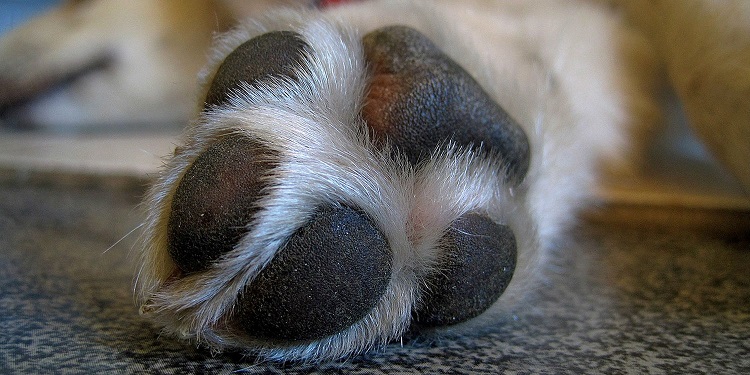How can we get our dog to stop licking its paws all of the time and what could be the cause?
Original Question: My three-year-old pug has started licking his feet constantly. He did this last year around this time and my vet thought he had seasonal allergies. He was prescribed Prednisone 5 mg (2 tablets daily for 3 days, one tablet daily for 5 days and then one tablet every second day) and Hydroxyzine caplets 25 mg (1 capsule three times a day ongoing). This helped and I stopped the treatment in the fall. The licking didn’t start up again until recently. Does this treatment seem appropriate? Is this just something we will have to treat yearly (like seasonal allergies in people)? - Annette
 Jul 30, 2017
Jul 30, 2017
Hi Annette,
Thanks for your question.
This is a really common complaint and there are only a few things that cause it. Itchy paws are typically caused by either an infection, trauma, foreign body, or allergies.
The first thing you want to do is have your veterinarian have a good look between the toes and under the paw. They will look for draining tracks or lesions that indicate that trauma has happened or something has punctured the skin. Quite frankly, these things are quite rare.
The really common possibilities are infection by either bacteria or yeast, or an allergic reaction. The first thing that needs to be performed is a test called a skin scraping, which is an inexpensive and quick test that determines if there are any bacteria or yeast on the skin. By collecting the sample from the skin and putting it on a glass slide, your veterinarian can look under a microscope and see if one of these entities is present and if so, a treatment can be started. Yeast is particularly common so if you wish, you could drop by your local pharmacy and pick up either an anti-fungal cream or an anti-fungal shampoo and start treating it daily yourself to see if you achieve any success before visiting your veterinarian for testing. If this doesn’t improve the condition within a few days, I would certainly recommend working with your veterinarian on a treatment plan. I want to mention that I have seen many cases where an allergy treatment has been used for itchy paws and it turned out to be a yeast infection. I once saw a dog that was treated with steroids and antihistamines like your pet for more than 5 years before I diagnosed it as a yeast infection, put it on anti-fungal medication, and resolved it within 8 weeks.
I would recommend that you request multiple skin scrapings to absolutely confirm that there is no yeast. Even if they see one yeast on a microscope slide, it is still significant and the anti-fungal treatment should be implemented.
Allergies are a much more difficult situation. The first thing to know is that a yeast infection or bacterial infection could be secondary to an allergic reaction that may be underlying this issue. If allergies are at the root of this problem you may have observed that it is occurring seasonally or that it quickly recurs after a treatment for a simple bacterial or yeast infection. There are many treatments for allergies if that is the final diagnosis. It’s important to know that allergies are treated with multiple modalities. Treatment can include the use of omega-3 fatty acids, shampoos, elimination diet trials, daily topical therapies, medication to control secondary infections and medication to reduce the allergic response. I would strongly recommend that you read our article on allergies entitled ‘Dealing With Your Pet’s Allergies’. The article reviews these treatments in detail and should give you lots of ideas beyond the medications you are giving now.
As a next step, if you still don’t get the results you want, I would recommend a referral to a veterinary dermatologist. You may even want to consider that now.
Hopefully this helps and good luck.
Dr. Clayton Greenway
Disclaimer: healthcareforpets.com and its team of veterinarians and clinicians do not endorse any products, services, or recommended advice. All advice presented by our veterinarians, clinicians, tools, resources, etc is not meant to replace a regular physical exam and consultation with your primary veterinarian or other clinicians. We always encourage you to seek medical advice from your regular veterinarian.

